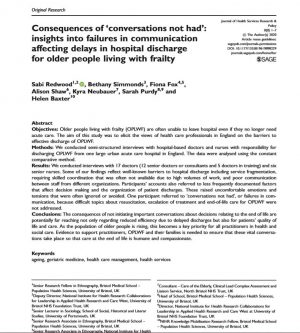Not talking about the end of life can contribute to delays in hospital discharges for older people living with frailty
7 February 2020
Failures in communication due to ‘conversations not had’ can contribute to delays in discharging older people living with frailty from hospital, a study published in the Journal of Health Services Research and Policy has found.
Older people living with frailty are more likely to struggle after even a minor illness or a change in medication or environment. They are often unable to leave hospital even if they no longer need hospital care.
The pilot study aimed to find out what happens on hospital wards that might lead to delays. Researchers interviewed 17 doctors and six senior nurses who were responsible for discharging older people living with frailty from one large urban acute care hospital.
Participants highlighted some of the well-known barriers to patient discharges, including fragmentation of care services and poor communication between staff from different organisations.
The interviews also brought to the surface other factors, such as how conversations were often avoided because they raised uncomfortable emotions and tensions. One interviewee referred to ‘conversations not had’ about topics such as resuscitation, escalation of treatment and end-of-life care for older people living with frailty. Because these discussions were difficult, these issues were not addressed, which contributed to delays in discharging patients.
Lead author, Dr Sabi Redwood, from the National Institute for Health and Care Research Applied Research Collaboration West (NIHR ARC West), says:
“Raising the issue of death and dying cannot remain the exclusive skill set of specialists such as those working in geriatric medicine and palliative care. As the population of older people is rising, this becomes a key priority for all practitioners in health and social care.
“The consequences of not initiating important conversations about decisions relating to the end of life are potentially far reaching, not only regarding delayed discharges but also for patients’ quality of life and care.
“We need more evidence to support practitioners, older people living with frailty and their families in ensuring that these vital conversations take place, so that care at the end of life is humane and compassionate.”
Paper:
Consequences of ‘conversations not had’: insights into failures in communication affecting delays in hospital discharge for older people living with frailty
Sabi Redwood, Bethany Simmonds, Fiona Fox, Alison Shaw, Kyra Neubauer, Sarah Purdy, Helen Baxter
Published in the Journal of Health Services Research and Policy
Paper
